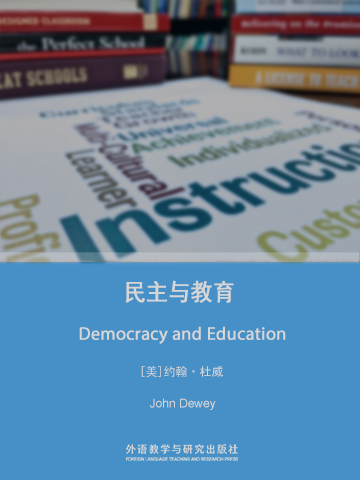一部改变美国传统教育的书,集中体现杜威实用主义教育哲学思想。
In Democracy and Education, Dewey argues that the primary ineluctable facts of the birth and death of each one of the constituent members in a social group determine the necessity of education. On one hand, there is the contrast between the immaturity of the new-born members of the group (its future sole representatives) and the maturity of the adult members who possess the knowledge and customs of the group. On the other hand, there is the necessity that these immature members be not merely physically preserved in adequate numbers, but that they be initiated into the interests, purposes, information, skill, and practices of the mature members: otherwise the group will cease its characteristic life.
Dewey observes that even in a "savage" tribe, the achievements of adults are far beyond what the immature members would be capable of if left to themselves. With the growth of civilization, the gap between the original capacities of the immature and the standards and customs of the elders increases. Mere physical growing up and mastery of the bare necessities of subsistence will not suffice to reproduce the life of the group. Deliberate effort and the taking of thoughtful pains are required. Beings who are born not only unaware of, but quite indifferent to, the aims and habits of the social group have to be rendered cognizant of them and actively interested. According to Dewey, education, and education alone, spans the gap.
本书被誉为二十世纪最重要的教育思想著作。作者详述了实用主义的教育理论,结合民主的理念剖析教育事业所面临的问题。书中不仅探讨了教育的性质、作用及目的等抽象的内容,同时也涵盖教育过程中遇到的具体问题。杜威一生著述甚丰,而以《民主与教育》影响最大。在英美学者的眼里,这本书可以与柏拉图的《理想国》、卢梭的《爱弥儿》相提并论。
Democracy and Education: An Introduction to the Philosophy of Education is a 1916 book by John Dewey. Dewey sought to at once synthesize, criticize, and expand upon the democratic (or proto-democratic) educational philosophies of Jean-Jacques Rousseau and Plato. He saw Rousseau's philosophy as overemphasizing the individual and Plato's philosophy as overemphasizing the society in which the individual lived.
For Dewey, this distinction was largely a false one; like Lev Vygotsky, he viewed the mind and its formation as a communal process. Thus the individual is a meaningful concept only when regarded as an inextricable part of his or her society, and the society has no meaning apart from its realization in the lives of its individual members. As evidenced in his later Experience and Nature (1925), this practical element, learning by doing, arose from his subscription to the philosophical school of Pragmatism.
- PREFACE
- Chapter 1 Education as A Necessity of Life
- Chapter 2 Education as a Social Function
- Chapter 3 Education as Direction
- Chapter 4 Education as Growth
- Chapter 5 Preparation, Unfolding, And Formal Discipline
- Chapter 6 Education as Conservative and Progressive
- Chapter 7 The Democratic Conception in Education
- Chapter 8 Aims In Education
- Chapter 9 Natural Development and Social Efficiency as Aims
- Chapter 10 Interest and Discipline
- Chapter 11 Experience and Thinking
- Chapter 12 Thinking in Education
- Chapter 13 The Nature of Method
- Chapter 14 The Nature of Subject Matter
- Chapter 15 Play and Work in the Curriculum
- Chapter 16 The Significance of Geography and History
- Chapter 17 Science in the Course of Study
- Chapter 18 Educational Values
- Chapter 19 Labor and Leisure
- Chapter 20 Intellectual and Practical Studies
- Chapter 21 Physical and Social Studies: Naturalism and Humanism
- Chapter 22 The Individual and the World
- Chapter 23 Vocational Aspects of Education
- Chapter 24 Philosophy of Education
- Chapter 25 Theories of Knowledge
- Chapter 26 Theories of Morals























 京公网安备 11010802032529号
京公网安备 11010802032529号
笔记加载中...